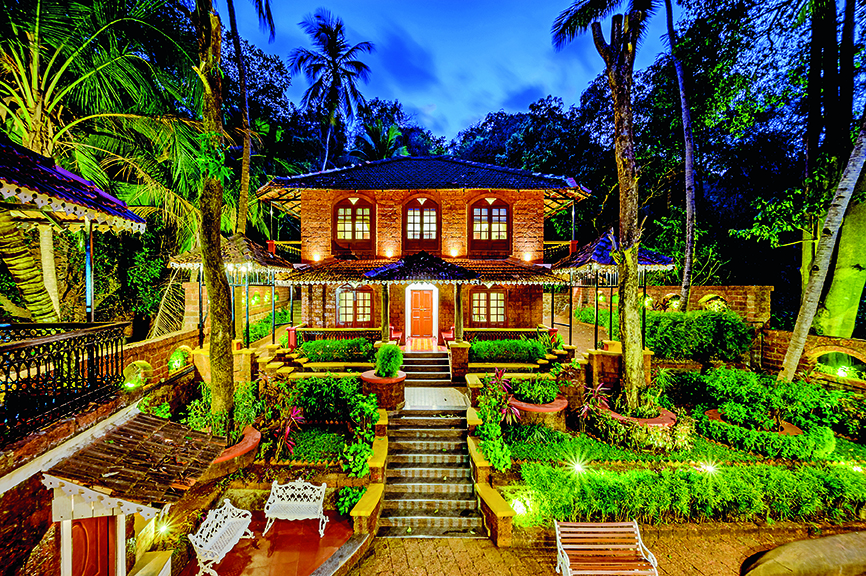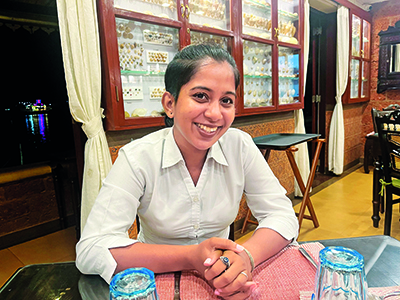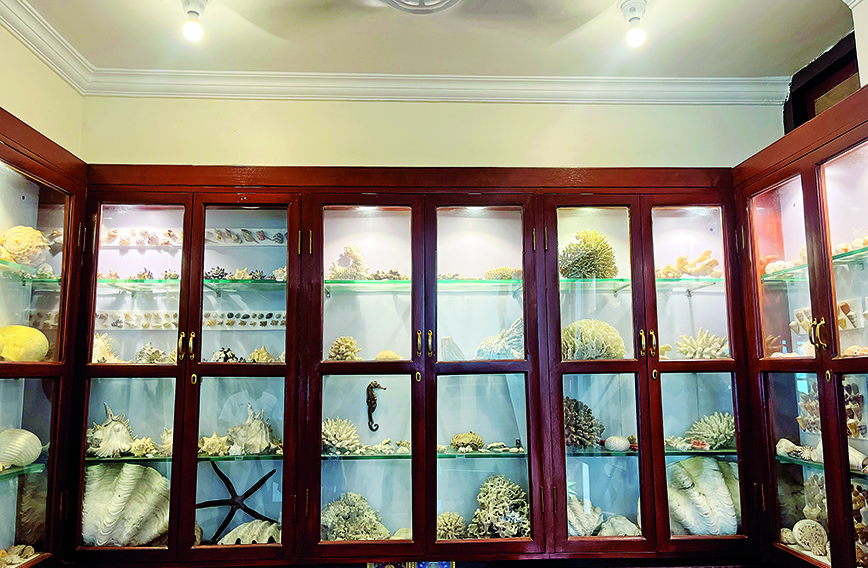
Handcrafted floor tiles, tiled roofs, terracotta and wood create a design medley and the deck adjoining the dining room
Three Waters, the Goan non-hotel
Civil Society Reviews
For the immersive traveller, it is a trapdoor to the traditional Goan way of life far removed from mindless tourists, messy beaches, loud parties and extortionist taxi drivers.
Over the years, Goa has been a great place to visit with its salubrious coastal weather, gentle and sincere people, brilliant food, monsoon rains and peaceful coexistence. History, culture, art and music have drawn people to Goa.
In recent times, however, it hasn’t been quite the same. With investors moving in, properties changing hands and tourism becoming brash, the Goan spirit has been in decline.
But for those willing to make the quest, things truly Goan are possible to find such as this villa which goes by the name of Three Waters.
Located in Betul deep in the south of Goa, everything about Three Waters sets it apart, beginning with its name. Two of the ‘waters’ are the Sal river and the Arabian Sea. Betul lies on the Sal at the point where it meets the Arabian Sea. The third ‘water’ is a nearby spring known apparently for its healing properties.
Three Waters is a place to stay. But if you are thinking that this is a hotel stop now! It is a ‘non-hotel’, we are told by the sign outside.
In fact, the villa is first and foremost a museum for seashells. A rare collection of 9,000 seashells, lovingly curated and preserved, adorn its walls. Staying here means being in their company.
If Three Waters is a non-hotel it is also a ‘museotel’, perhaps the only one of its kind with the rarest collection of seashells in the world.
Restoring an old villa and making it a museum for seashells has been the work of Victor Hugo Gomes, a Goan artist well known for his efforts to preserve Goa’s past. He has done museums on transportation, food, implements. He is an outstanding restorer and collector too — gathering old doors, windows and other artefacts and putting them to use again to bring back the past exactly right.
 Enveloped in green, the villa has been carefully restored
Enveloped in green, the villa has been carefully restored
For Three Waters as a place to stay he has teamed up with Neemrana Hotels, whose founder, Aman Nath’s efforts at reviving forts in Rajasthan are well known. Gomes and Nath share a bandwidth. They are both master restorers and know how to elegantly revive things of beauty from the past.
Nath brings to Three Waters his ample experience in creating and managing off-beat properties, mostly steeped in local history and culture and also bearing his signature nuances. The most famous for a long time was Neemrana in Rajasthan. But following on its success and iconic status there have been many more properties that have been transformed by him from being ruins into destinations sought out by discerning travellers.
That Nath and Hugo complement each other well shows in the terracotta, wood, handcrafted floor tiles and tiled roofs at Three Waters. A million nuances hang together in some strange harmony, making it an elevating experience to be there.
Only non-mechanized fishing is permitted at Betul. You could add that to the reasons for visiting it in these days of trawling by corporations and big menacing ports destructively straddling coastlines. At Betul, you are at peace with the river and the sea. Fishermen set out in their low-slung boats with sputtering motors to cast their nets. Trawlers stop a decent distance away.
To come here is to choose to spend some days in slow motion. Amble through the village, cycle along the Sal, do some birdwatching, take a dingy to the beachhead at the confluence of the Sal and the ocean. For those with a yen for history and a ramble through ruins, there are the remnants of a historical fort, Carbo de Rama, one of the only two Hindu forts in Goa built by Shivaji.
Don’t feel like moving at all? Then sit out on the deck adjoining the dining room and observe the river. When the tide is in, the boats go out. And when the tide is out the village dogs jump in to catch their share of fish.
Remember you would be here for the quietude, not the party. It will be to sink into silence, not splash around. The setting is thick with tall trees and greenery. This is the Western Ghats, remember, with its majestic biodiversity, snakes, insects, birds et al.
A swimming pool at the back of the villa, and trees overhead, is good enough for some decent lengths while the chirping of birds fills the air. There are books, board games and fishing rods on offer.
 Here’s where the Sal river meets the Arabian Sea
Here’s where the Sal river meets the Arabian Sea
Non-hotel this might be, but as a paying guest, you will get your broadband, air-conditioning, mini-bar, meals and laundry service. Even a charging point for electric cars.
The identity Three Waters adopts is personalized, customized, chemical-free and born out of a loving restoration effort from the tiles on the floors to the carved furniture, tiled roof, wooden columns and windows and doors.
A non-hotel needs ‘non-staff’. The team that runs Three Waters from one day to the next has been drawn from the Hugo and Nath collection of people. They are just different and know what it takes to keep a ‘non-hotel’ up and running.
 |
|
Here’s where the Sal river meets the Arabian Sea |
Corine Fernandes, a young Goan with a history degree, manages the operation. She was drawn to Gomes’ efforts at restoration and explorations into Goa’s culture. She worked with him before her current role at Three Waters.
She says the original purpose was restoration, not to run tourism. But, as Gomes struggled to meet the expenses of the restoration effort, and set up the seashells museum, the idea of earning revenue from the place emerged.
“But he is essentially a restorer. He used to restore old houses. When the owners wanted the doors and windows and old furniture replaced, he would buy them and keep them. The doors and the windows that you see here were from such houses, brought to this property. He restored them and he fixed them,” she explains.
Asked if the rooms fill up a lot, Fernandes says: “Young people come to Goa to party. This is a quiet place and so you don’t have them coming here. But the rooms do fill up. Like last June, July, we were crowded. As well as August, September. In a year, for about five months, you have a good number of bookings.”
There are those who especially come for the rains, she says, explaining that people who want to experience the natural beauty and uniqueness of Goa stay to be part of it in seclusion.
“There is the smell of the mud, especially after the first shower. And then you’ll see a lot of fish. You will see water coming up on the road, actually. And then you see a lot of dogs going to catch fish. They all line up, the dogs. And it’s amazing to watch the dogs, the way they catch crabs,” she says.
 A museum of seashells, perhaps the only one of its kind
A museum of seashells, perhaps the only one of its kind
Three Waters is an example of destination tourism off the beaten track. It is for travellers looking for the Goa they don’t usually find. Because it is deep in the south of Goa, getting to Betul is a long ride from either of Goa’s two airports. Once there it is an opportunity to connect with nature and heritage, to experience the food. If Goa’s more popular spots throb with activity, Betul is the kind of place to go fishing in silence.
People who have stopped visiting Goa feel they end up spending as much as they would going to Thailand, Singapore, Malaysia, Sri Lanka and even Europe. They are also more professional in their hospitality — which means they are safer, cleaner and more dependable. They know to make vacations memorable and use their history, traditions and natural beauty to offer an experience. Goa, in the midst of the exotic Western Ghats, could similarly flourish. Three Waters is an example of how it could hold its own.
Comments
Currently there are no Comments. Be first to write a comment!



